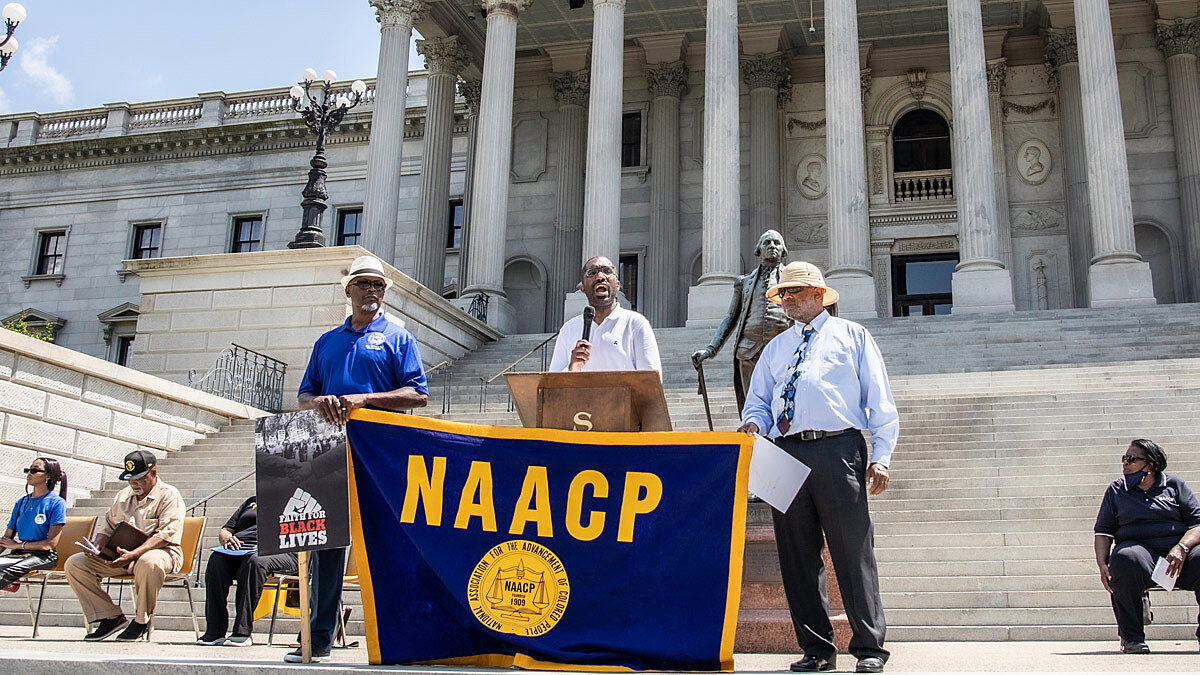
Methodists rally to end death penalty after executions announced
(Photo by Jackie Jackson)
By Jessica Brodie
United Methodists are among loud voices crying both to end the death penalty in South Carolina and to get the execution of death row inmate Richard Moore commuted.
The Rev. Hillary Taylor, the Advocacy area of Conference Connectional Ministries and others with the UMC are joining with South Carolinians for Alternatives to the Death Penalty to stop what many consider the barbaric practice of human execution in this state.
As of press time, they had just participated in a rally at the South Carolina Statehouse April 23 with the National Association for the Advancement of Colored People to denounce the death penalty and were gearing up for a press conference April 27 with the South Carolina Black Activist Coalition, also at the Statehouse, to continue the conversation.
Much recent activity came about when it was announced in March that the execution date had been set for Richard Moore, convicted in the 1999 killing of convenience store clerk James Mahoney in Spartanburg. The last execution in South Carolina occurred in 2011, and since then, Department of Corrections officials have stated they have been unsuccessful in securing lethal injection drugs. South Carolina passed a law in 2021 that made the electric chair the default execution method instead of lethal injection, with the firing squad as an alternative.
In March, state corrections officials revealed renovations were complete on the state’s death chamber to accommodate the firing squad, and Moore’s execution date was set for April 29.
He was given the choice between the firing squad and the electric chair.
In April, Moore chose execution by firing squad, though he stated he found both options unconstitutional but was forced to make a decision by a deadline.
On April 20, South Carolina’s Supreme Court issued a temporary stay blocking Moore’s execution. They did not say why they issued the stay, but at issue are a number of challenges, including whether Moore’s sentence was proportionate to his crime, the constitutionality of the state’s execution methods, the legitimacy of prison officials’ claims that they can’t get lethal injection drugs, and whether the firing squad and the electric chair are cruel and unusual punishments.
A second death-row inmate, Brad Keith Sigmon, is scheduled to be executed on May 13. Sigmon was convicted of two counts of murder and first-degree burglary in 2002.
Meredith Matthews, community organizer for South Carolinians for Alternatives to the Death Penalty, said she is appalled that this state not only legalizes public executions but uses what she calls cruel practices.
“The firing squad is something we see in other parts of world,” said Matthews, who grew up in the UMC and considers the death penalty to be a practice not in line with Christianity.
“Spiritually, it’s hard for me to reconcile how a state that prides itself on Christian values can then turn around and not offer grace.”
Matthews noted that Moore is extremely remorseful about the crime, which she said was not premeditated murder, as Moore killed the clerk with the clerk’s gun and did not bring a weapon into the store. She also noted that Moore is a Black man, yet there was not a single Black person on his jury, and the judge, prosecutor and defense attorney were all White people.
“He’s not just ‘a death row inmate’ but a father, a son, and we need to remember that because it is a reflection on all of us,” Matthews said.
Taylor said much the same, noting the death penalty is arbitrary, politically motivated and expensive, but most importantly, not in line with Christian theology.
“There are all sorts of practical reasons why we shouldn’t be for the death penalty, but furthermore, as Christians, we should be against the death penalty because we believe no one is beyond redemption,” said Taylor, who is interim convener for South Carolinians for Alternatives to the Death Penalty. “We are more than the worst thing we have ever done.”
Also, she noted, Jesus was executed—we worship an executed God.
“The Bible belt has become the death belt, but there are alternatives to the death penalty where we can restore the image of the person created by God who’s done this terrible thing but also really work to heal a family from trauma and prevent these things from happening again.”
She said that endorsing the death penalty makes Christians look barbaric, causing people to look askance at our faith.
“The real question we should ask is who would Jesus execute, and the answer is none,” Taylor said.
For more on the fight for death penalty alternatives and what the organization is doing regarding Moore’s execution, visit SCADP.org.